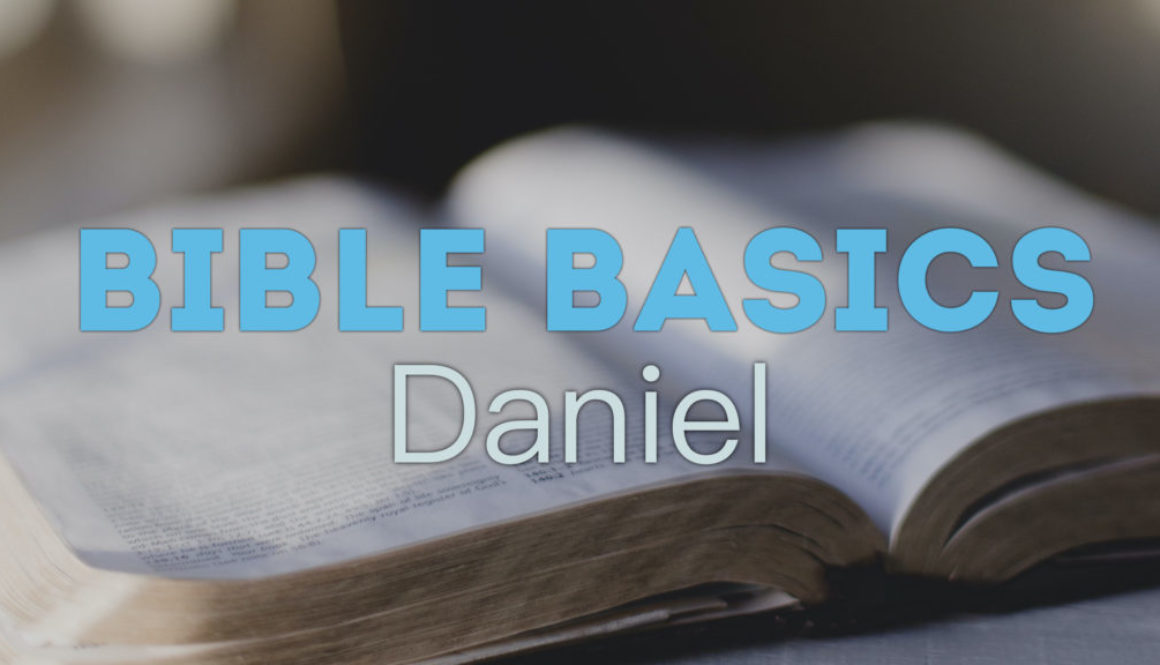Daniel
Author
Daniel, which means “God is Judge” or “God is Prince.” He is also given the name Belteshazzar in captivity by one of Nebuchadnezzar’s officers (1:7), which means “Baal’s Prince.”
Date
Daniel’s prophetic ministry covers all of Israel’s time in captivity, recording both the fall of Jerusalem, and Daniel’s personal experience being carried away into captivity in 605 B.C. (1:1-8) through his visions during the reign King Cyrus in 536 B.C. (10:1). It was King Cyrus who would release the Jews to re-settle in Jerusalem.
Most scholars assume that Daniel wrote the book sometime shortly after the events took place, possibly around 530 B.C. Daniel would have been around 90 years old at that time. (The events of Daniels death are unknown.)
Audience and Purpose
Daniel, along with Ezekiel, is one of the prophets during the time of captivity to Babylon. Whereas Ezekiel’s prophecies were primarily calling the Jewish people back to faith in God, Daniel’s ministry was primarily to the rulers of their pagan captors. The majority of his prophecies deal with the rise and fall of the gentile empires, leading up to the Kingdom of God being released over the earth.
You can easily distinguish which audience Daniel was directing his message to, by the language he uses.
- Daniel 1:1-2:4a are written in Hebrew, which was the language of the Jews.
- Daniel 2:4b-7:28 are written in Aramaic, which was the official “business language” of the Babylonian empire.
- Daniel 8:1 to the end of the book is written, again, in Hebrew.
Major Themes
- Sovereignty of God and Human Empire. Many of the stories in Daniel concerning the Babylonian kings, was well as the prophetic visions of Daniel concerning the future kingdoms of the world, are given to demonstrate God’s sovereignty above all human governments and controls. (See Daniel 2:21)
- Hope in the midst of Oppression and Persecution.
- Prophecy.
- Apocalypse. An apocalypse is generally considered to be a revelation of future events, especially on a broader, global scale and dealing with end times.
Key Scriptures
- Daniel 4:3 — “How great are his signs, how mighty his wonders! His kingdom is an everlasting kingdom, and his dominion endures from generation to generation.”
- Daniel 6:3 — “Then this Daniel became distinguished above all the other high officials and satraps, because an excellent spirit was in him. And the king planned to set him over the whole kingdom.”
- Daniel 10:12 — “Then he said to me, “Fear not, Daniel, for from the first day that you set your heart to understand and humbled yourself before your God, your words have been heard, and I have come because of your words.”
Outline
- Daniel 1:1–6:28 — Daniel’s Life in Babylon
- Daniel 1:1-21 — Introduction
- Daniel 2:1-49 — Nebuchadnezzar’s Dream of the Statue
- Daniel 3:1-30 — Nebuchadnezzar Builds the Statue
- Daniel 4:1-37 — Nebuchadnezzar’s Dream of the Fallen Tree
- Daniel 5:1-31 — Daniel’s Feast
- Daniel 6:1-28 — Daniel in the Lion’s Den
- Daniel 7:1–12:13 — Daniel’s Visions
- Daniel 7:1-28 — Daniel’s First Vision: The Four Great Beasts
- Daniel 8:1-27 — Daniel’s Second Vision: The Ram, The Goat, and The Little Horn
- Daniel 9:1-19 — Daniel’s Prayer for His People
- Daniel 9:20-27 — Gabriel Answers Daniels Prayer: The 70 Weeks Prophecy
- Daniel 10:1-12:13 — Daniel’s Visions of The Spiritual Battle over Human Empires
Gospel Summary
W. Graham Scroggie, in his book “Know Your Bible,” called Daniel “the greatest book in the Bible on godless kingdoms and the Kingdom of God.”1 As Daniel sees visions of empires rising and falling, looking far beyond his own time in Babylon, there is only one foreseeable truth to world events: God is the one in charge.
Although many interpretations of Daniel’s visions have been given, the question of fulfillment remains. Some believe Daniel’s visions and the were complete with the Syrian King, Antiochus IV in around 160B.C. Others believe they were fulfilled with the fall of Jerusalem to the Romans in 70A.D. Still, others believe Daniel’s visions point to a future ruler to come. Nevertheless, the point Daniel intends to bring is valid no matter which view is correct. God is sovereign over kings and kingdoms, and His promise to restore His people is a guarantee. God’s Kingdom is eternal, and there is only one King who will remain standing in the end – Jesus Christ.
1 Quoted in “Jensen’s Survey of the Old Testament,” page 374.
If you’re enjoying the content I produce, a little caffeine to keep me going would be appreciated!
© Anthony Scott Ingram 2021. All Rights Reserved.
Photo by Carolyn V on Unsplash
Unless otherwise indicated, all Scripture quotations are from The Holy Bible, English Standard Version®, copyright © 2001 by Crossway Bibles, a publishing ministry of Good News Publishers. Used by permission. All rights reserved.”
Please note that I do get a small kickback from Amazon for any purchases made using the links on this post. Should you choose to purchase from them, I just want to say thank you for further supporting my work in ministry!
